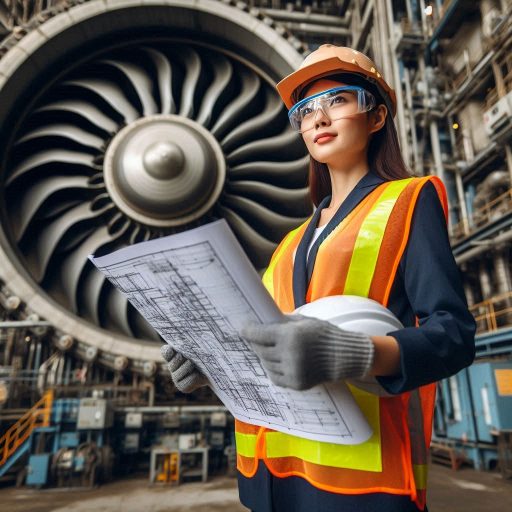Introduction
The Importance of Wind Turbine Technicians
Wind turbine technicians play a pivotal role in the renewable energy sector.
They are responsible for ensuring that wind turbines operate efficiently and safely.
These technicians conduct routine maintenance, perform repairs, and troubleshoot issues to maximize turbine performance.
As the world shifts towards cleaner energy sources, the role of wind turbine technicians becomes increasingly vital.
Their expertise helps maintain the reliability and productivity of wind energy systems.
The Increasing Demand for Skilled Technicians
The demand for skilled wind turbine technicians is growing rapidly.
The expansion of wind farms and the development of new technologies drive this demand.
As investments in renewable energy infrastructure rise, more technicians are needed to maintain and repair a growing number of turbines.
This trend highlights the importance of having a skilled workforce to support the sector’s expansion.
The Competitive Nature of the Job Market
The job market for wind turbine technicians is becoming more competitive.
Applicants need to showcase technical skills, problem-solving abilities, and a strong commitment to safety.
An understanding of turbine mechanics, electrical systems, and advanced diagnostic tools is essential.
To stand out, candidates should highlight relevant certifications, hands-on experience, and a passion for the renewable energy field.
Demonstrating knowledge of industry trends and advancements can also enhance your attractiveness as a job candidate.
Preparing for interviews by emphasizing these aspects can set you apart from other candidates.
Research the Company
Encourage Aspiring Technicians to Research the Company
Before an interview, thoroughly research the company where you are applying.
Understand their history, mission, and core values.
This preparation shows your interest and dedication.
It also helps you tailor your answers to align with the company‘s culture.
Learn about their recent projects and achievements to discuss during the interview.
This knowledge demonstrates that you are proactive and well-prepared.
Importance of Understanding the Company‘s Values and Projects
Understanding a company’s values is crucial.
It allows you to show how your personal values align with theirs.
Discussing the company‘s projects during the interview highlights your enthusiasm and understanding of their work.
Be ready to explain how your skills and experiences relate to these projects.
This alignment is essential to show that you are not only a good fit for the role but also a good fit for the company culture.
Explore the Company‘s Website and Social Media Platforms
Explore the company‘s website before your interview.
Review their about page, recent news, and any updates on their projects.
This information helps you ask informed questions and make a strong impression.
Also, check out their social media platforms.
Social media can provide insights into the company‘s current initiatives and employee perspectives.
Engaging with their content can also give you talking points during the interview.
By thoroughly researching the company and understanding their values and projects, you position yourself as a knowledgeable and interested candidate.
This preparation helps you engage effectively with the interviewers and demonstrate your commitment to the role.
Remember, a well-prepared candidate who aligns with the company‘s goals and values is more likely to stand out and succeed in the interview process.
Understand the Job Role
Advise Candidates to Fully Understand the Responsibilities of a Wind Turbine Technician
Before the interview, candidates must thoroughly understand the responsibilities of a wind turbine technician.
This knowledge will help in responding to questions with confidence.
A wind turbine technician’s role involves maintaining and repairing wind turbines to ensure they operate efficiently.
Technicians work with complex machinery, requiring a clear grasp of their daily tasks and challenges.
Understanding these responsibilities will demonstrate preparedness and a genuine interest in the role.
It shows that you are aware of what the job entails and are committed to performing these tasks effectively.
Different Tasks Involved, Such as Installation, Maintenance, and Repair
Candidates should be aware of the various tasks involved in the role of a wind turbine technician.
Installation involves setting up new turbines and ensuring they are operational from the start.
Maintenance includes regular inspections and servicing to prevent issues and ensure optimal performance.
Repair tasks focus on fixing any malfunctioning parts or components to restore turbine functionality.
Being familiar with these tasks will allow candidates to discuss their experience and skills in relation to the specific duties of the job.
It will also highlight their ability to handle the diverse aspects of the role.
The Need for Relevant Skills and Qualifications for the Job
To succeed as a wind turbine technician, relevant skills and qualifications are essential.
Candidates should emphasize their technical skills, such as understanding electrical systems and mechanical repairs.
Practical experience with turbines or similar machinery is highly beneficial.
Additionally, possessing certifications related to wind turbine technology or safety is advantageous.
Highlighting these qualifications during the interview will demonstrate your readiness for the role.
It shows that you have the necessary background to handle the responsibilities effectively.
Stressing these skills and qualifications will help set you apart from other candidates and showcase your suitability for the position.
Additional Tips for a Successful Interview
In addition to understanding responsibilities and tasks, candidates should prepare for common interview questions.
Practice answering questions about your experience, problem-solving skills, and ability to work in challenging conditions.
Research the company and its wind turbine projects to show your interest and enthusiasm.
Prepare questions to ask the interviewer about the team, training, and company culture.
This preparation will help you present yourself as a well-rounded candidate who is ready to contribute effectively to the team.
By demonstrating a thorough understanding of the role and showcasing your relevant skills and qualifications, you will enhance your chances of success in securing the position.
Prepare for Technical Questions
Studying Common Technical Questions Related to Wind Turbines
Preparing for an interview as a wind turbine technician requires a thorough understanding of technical concepts.
Focus on common questions about how wind turbines operate.
Review mechanical, electrical, and hydraulic systems in depth.
Be prepared for questions about troubleshooting, maintenance, and safety procedures.
Familiarize yourself with specific components such as gearboxes, generators, and control systems.
Knowing how to diagnose and resolve common issues will be crucial.
Staying updated with the latest technologies and industry standards can give you an edge.
Resources for Candidates to Review Technical Concepts and Terminologies
Utilize a range of resources to review essential technical concepts and terminologies.
Start with industry-specific textbooks and manuals.
Websites like the American Wind Energy Association (AWEA) and the Global Wind Organization (GWO) offer valuable information.
Online courses and certification programs can enhance your knowledge and skills.
Look for training materials that cover wind turbine design, operation, and maintenance.
Industry forums and discussion groups can also offer insights into current practices and technologies.
Practice Scenarios to Help Candidates Feel Confident During the Interview
Engage in practice scenarios to build confidence before the interview.
Simulate troubleshooting exercises where you diagnose and resolve hypothetical issues with wind turbines.
Use case studies involving maintenance challenges that require problem-solving skills.
Role-play interviews with a friend or mentor to refine your responses and communication.
Practicing under simulated conditions can help you become more comfortable with the interview format and the types of questions asked.
Additional Tips for a Successful Interview
Prepare to discuss your hands-on experience and how it relates to the job.
Be ready to explain specific projects or tasks you‘ve completed.
Highlight any relevant certifications or training, such as those from GWO or similar organizations.
Demonstrating your ability to work effectively in a team and handle high-pressure situations can set you apart from other candidates.
Showcase Your Problem-Solving Skills
Employers value technicians who can think critically and solve problems efficiently.
Be prepared to discuss instances where you resolved technical issues or improved processes.
Provide examples that highlight your problem-solving approach and the impact it had on the project or team.
Safety Awareness
Safety is a top priority in wind turbine maintenance.
Be ready to discuss your knowledge of safety protocols and procedures.
Explain how you ensure compliance with safety standards and manage risks.
Show that you prioritize safety in every aspect of your work.
By thoroughly preparing for these aspects, you will increase your chances of success in your wind turbine technician interview.
Demonstrating your technical expertise, problem-solving abilities, and commitment to safety will make you a standout candidate.
Read: Quality Control Inspector: Technical Skills Needed
Showcase Relevant Experience
Experience in Relevant Fields
When interviewing for a wind turbine technician position, it is essential to highlight relevant experience.
Emphasize any past work in mechanical or electrical fields.
Discuss specific roles you have held, such as maintenance or repair positions.
Showcase experience with similar machinery or equipment, focusing on tasks that align with wind turbine technology.
Detail any hands-on training or certifications you have obtained.
If you have worked on renewable energy projects, make sure to mention this.
Showing a strong background in related fields demonstrates your readiness for the role.
Emphasizing Transferable Skills
In addition to direct experience, emphasize transferable skills that match the job requirements.
Highlight your problem-solving abilities, as troubleshooting is a critical aspect of the job.
Mention any technical skills you have, such as electrical diagnostics or mechanical repairs.
Communication skills are also valuable, as you will need to work effectively with a team.
Stress your ability to work at heights and in various weather conditions, if applicable.
Being able to adapt and learn quickly is another important skill.
Show how these skills will benefit the position and the team.
Communicating Past Experiences Effectively
To communicate past experiences effectively during the interview, use the STAR method: Situation, Task, Action, and Result.
Start by describing the situation or problem you faced.
Next, explain the task you needed to complete.
Detail the specific actions you took to address the issue.
Finally, highlight the results of your actions.
Be concise and focus on achievements and improvements.
Use metrics or data where possible to quantify your impact.
Practice discussing your experiences beforehand to ensure clarity and confidence.
Tailor your responses to align with the job‘s requirements and demonstrate how your background prepares you for the role.
Transform Your Career Today
Unlock a personalized career strategy that drives real results. Get tailored advice and a roadmap designed just for you.
Start NowAdditional Tips for Interview Success
Prepare by researching the company and understanding their specific needs and values.
Show enthusiasm for wind energy and the role you are applying for.
Be ready to discuss industry trends and how they may affect the job.
Prepare questions for the interviewer to demonstrate your interest and initiative.
Dress professionally and arrive on time to make a positive first impression.
Generally, focus on your relevant experience, emphasize transferable skills, and communicate past achievements effectively.
Tailoring your responses to align with the job requirements and demonstrating enthusiasm for the role will help you stand out as a strong candidate.
Read: Common Mistakes in Quality Control Inspections

Demonstrate Problem-Solving Skills
Importance of Showcasing Problem-Solving Skills During the Interview
When interviewing for a wind turbine technician position, emphasize your problem-solving skills.
Employers seek technicians who can handle complex issues on-site.
Demonstrating your ability to troubleshoot and resolve problems effectively is crucial.
Prepare to discuss specific situations where you successfully addressed technical challenges.
Examples of Potential Issues That May Arise in the Field and How to Solve Them
Wind turbine technicians often face various challenges.
For instance, a common issue is a malfunctioning blade pitch system.
This system adjusts the angle of the blades to optimize performance.
If it fails, turbines may operate inefficiently or stop working.
Show how you would diagnose the problem, such as checking hydraulic systems or electronic controls, and outline your solution.
Another issue might be a generator that isn’t producing power.
Explain how you would investigate potential causes, like electrical faults or mechanical failures.
Discuss checking connections, testing components, and replacing faulty parts as needed.
Consider mechanical failures, such as gearbox issues.
Describe your approach to inspecting the gearbox, identifying wear or damage, and taking corrective actions.
Highlight your experience in using diagnostic tools and techniques to resolve these issues.
Encourage Candidates to Share Real-Life Examples of Problem-Solving Experiences
During your interview, share concrete examples of how you have tackled problems in past roles.
Discuss a time when you identified a problem quickly and implemented an effective solution.
This could involve resolving an electrical fault, fixing a mechanical issue, or improving maintenance procedures.
Detail the steps you took to address the problem and the outcome of your actions.
This helps interviewers gauge your practical experience and your approach to problem-solving.
Being specific about your problem-solving process shows that you are prepared for the challenges of the job.
In summary, showcasing problem-solving skills is essential in a wind turbine technician interview.
Provide examples of potential field issues and how you would resolve them.
Share real-life experiences to demonstrate your expertise and readiness for the role.
This approach highlights your ability to handle technical challenges effectively and makes you a strong candidate for the position.
Read: Continuing Education for Radiologic Technologists
Emphasize Safety Awareness
Significance of Safety Protocols in the Wind Energy Industry
Safety protocols are crucial in the wind energy industry due to the nature of the work.
Wind turbine technicians often work at great heights and in challenging weather conditions.
These conditions increase the risk of accidents, making adherence to safety standards essential.
The industry places a strong emphasis on maintaining rigorous safety practices to protect workers.
Technicians must follow detailed safety procedures to prevent falls, electrical hazards, and equipment malfunctions.
Demonstrating a thorough understanding of these protocols shows employers that you prioritize safety and are prepared for the challenges of the job.
Encourage Candidates to Demonstrate Their Commitment to Safety During the Interview
During your interview, emphasize your commitment to safety by discussing relevant experiences.
Share examples of how you have followed safety protocols in past roles.
Describe any safety training or certifications you have completed.
Highlight instances where you proactively identified and addressed potential hazards.
Explain how you stay updated on safety regulations and industry best practices.
Showing enthusiasm for safety and a proactive approach reassures employers of your dedication to maintaining a safe work environment.
Being prepared to discuss safety topics demonstrates your seriousness about working in the wind energy sector.
Tips on How to Communicate a Strong Safety Mindset to Potential Employers
To effectively communicate a strong safety mindset, start by sharing specific examples of your safety practices.
Mention any safety courses or certifications you have obtained.
Talk about how you have implemented safety protocols in previous positions.
Use clear, concise language to describe your understanding of safety procedures.
Be prepared to discuss how you handle emergency situations and the steps you take to ensure your safety and that of your team.
Demonstrate your knowledge of industry-specific safety regulations and your ability to adapt to new safety standards.
Additionally, showing enthusiasm for safety can make a significant impact.
Express your commitment to continuous learning about safety improvements and best practices.
Highlight any experience with safety audits or inspections, and describe how you have contributed to a culture of safety in your previous roles.
Your ability to communicate effectively about safety issues will signal to potential employers that you are well-prepared to handle the demands of the job and contribute to a safe working environment.
Overall, safety is a top priority in the wind energy industry.
During your interview, clearly demonstrate your commitment to safety through relevant experiences and knowledge.
Communicate effectively about your safety mindset to show that you are a qualified and responsible candidate.
Read: Radiologic Technologist: Work Environment Insights
Uncover the Details: Top Chemical Engineering Universities in the USA
Discover More: Biomedical Engineering: Impact on Surgery Techniques
Ask Questions
Advise Candidates to Prepare Thoughtful Questions to Ask the Interviewer
Preparing for an interview as a wind turbine technician involves more than just answering questions.
It is crucial to engage actively with the interviewer.
One effective way to demonstrate your interest is by preparing thoughtful questions.
Ask about the company‘s safety practices, training opportunities, and future projects.
These questions show you are serious about the role and proactive in understanding your potential workplace.
Inquire About the Company’s Safety Practices, Training Opportunities, and Future Projects
Start by inquiring about the company’s safety practices.
Wind turbine technicians work in environments that demand high safety standards.
Understanding how a company maintains these standards reflects your concern for personal and team safety.
It also shows you are prepared to follow and contribute to these practices.
Next, ask about training opportunities.
The wind energy sector is constantly evolving, with new technologies and methods emerging regularly.
Inquiring about training opportunities demonstrates your willingness to learn and adapt.
It indicates that you are committed to keeping your skills up-to-date and contributing effectively to the team.
Inquire about future projects to gauge the company’s growth and direction.
Knowing what projects are on the horizon can give you insight into the company‘s stability and your potential role within it.
It shows you are interested in the long-term prospects and how you can contribute to future successes.
Importance of Showing Genuine Interest in the Job and Company
Demonstrating genuine interest in the job and the company is vital.
Your enthusiasm for the role will set you apart from other candidates.
Show that you are eager to join the team and contribute to the company‘s mission and goals.
This enthusiasm can be a deciding factor for employers when choosing between candidates.
Make sure your questions are specific and relevant.
Generic questions can make it seem like you are not fully engaged or prepared.
Tailor your inquiries based on your research about the company and the role.
This personalized approach will highlight your dedication and preparedness.
Lastly, convey your interest through your body language and responses.
Maintain eye contact, listen actively, and respond thoughtfully.
Your demeanor can communicate as much as your words.
Showing genuine enthusiasm and engagement during the interview reflects your readiness for the role.
In a nutshell, preparing thoughtful questions about safety practices, training opportunities, and future projects is essential.
Showing genuine interest and enthusiasm for the job and company can significantly enhance your interview performance.
By demonstrating that you are well-prepared and engaged, you improve your chances of making a positive impression and securing the position.
Follow Up After the Interview
Sending a Thank-You Email to the Interviewer
Sending a thank-you email after an interview is a crucial step in the job application process.
It demonstrates professionalism and courtesy.
This simple gesture can leave a positive impression on the interviewer.
Make sure to send the email within 24 hours of the interview to ensure it‘s timely.
Importance of Expressing Gratitude and Reiterating Interest
In your thank-you email, express genuine gratitude for the opportunity to interview.
Acknowledge the time the interviewer spent with you and mention specific aspects of the conversation that you found valuable.
This shows that you paid attention and appreciated the discussion.
Reiterate your interest in the position and the company.
Reinforcing your enthusiasm can help remind the interviewer why you are a strong candidate.
Briefly highlight your key qualifications and how they align with the role.
This is an opportunity to reaffirm your fit for the job and emphasize why you are excited about the potential opportunity.
Tips on How to Follow Up Professionally
When following up, be professional and considerate.
Avoid being overly aggressive or pushy.
If you haven‘t heard back within the timeframe discussed during the interview, a polite follow-up email is appropriate.
In your follow-up email, reiterate your appreciation for the interview and express continued interest in the position.
Ask if there is any additional information you can provide or if there are any updates on the hiring process.
Keep the tone positive and respectful, showing your eagerness without pressuring the interviewer.
Be mindful of timing.
Wait a week or two after your initial thank-you email before sending a follow-up message.
This allows enough time for the hiring process to advance without appearing impatient.
If you receive a response, be prompt in your reply, maintaining the professionalism you demonstrated throughout the interview process.
Ultimately, sending a thank-you email and following up professionally are key aspects of the job application process.
Express gratitude, reiterate interest, and follow up thoughtfully to leave a lasting positive impression.
This approach not only demonstrates your professionalism but also reinforces your enthusiasm and suitability for the role.
Find Out More: Troubleshooting Skills for Industrial Machinery Mechanics
Conclusion
We covered essential tips for excelling in interviews as a wind turbine technician.
Key points include demonstrating technical expertise and problem-solving skills.
Prepare to discuss your hands-on experience with wind turbines, including any maintenance, inspections, or repairs you’ve performed.
Highlight your familiarity with safety protocols and any relevant certifications or training.
When answering questions, use specific examples that illustrate your ability to handle challenges effectively.
Emphasize your understanding of wind turbine mechanics and your experience troubleshooting issues.
Practice common interview questions to ensure you convey your qualifications confidently and clearly.
Additionally, prepare thoughtful questions for the interviewer about the company and its projects.
Show genuine interest in the role and the organization.
Aspiring wind turbine technicians should utilize these interview tips to make a strong impression.
With thorough preparation and dedication, you can stand out in the competitive job market.
Properly showcasing your skills and enthusiasm can lead to a successful career in the wind energy sector.
Embrace these strategies to enhance your chances of securing the position and excelling in this growing field.
Transform Your Career Today
Unlock a personalized career strategy that drives real results. Get tailored advice and a roadmap designed just for you.
Start Now



